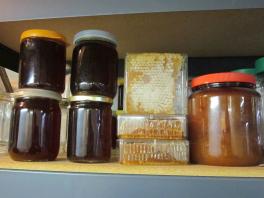






 In the summer of 2008, Jeanne Hansen’s husband ate through seven, five-pound jars of honey. That’s when she decided to redirect her honey money towards a new hobby—beekeeping.
In the summer of 2008, Jeanne Hansen’s husband ate through seven, five-pound jars of honey. That’s when she decided to redirect her honey money towards a new hobby—beekeeping.
“I can have a lot more fun for the same amount of honey,” Hansen said.
Hansen read 16 books on beekeeping over the next winter. And after she took a class from the Wisconsin Honey Producers Association in 2009, she acquired her own hives. Now she has eight hives around town, including two in her backyard.
Hansen also teaches other honey enthusiasts how to keep bees, and is an active member of the Dane County Beekeepers Association.
Hansen has already taught one day-long beekeeping class this season, and will teach three more in the coming months.
This may be the biggest year yet for bees in Madison.
A new ordinance that passed on Feb. 28 legalized residential beekeeping, giving beekeepers the city’s blessing for a productive honey season.
Mike Gourlie participated in Hansen’s 2011 spring class and found it valuable in teaching him all the practical skills needed to start his own hives.
The beekeeping classes usually draw about 40 students, and they aren’t all from Madison, Hansen said. She has had people come from Illinois and all over Wisconsin to learn the basics of beekeeping.
While a number of class attendees are retired, Hansen said families, urban gardeners, and people with budding orchards attend as well.
“There aren’t enough wild bees to do the pollination well,” Hansen said. “So if you want your orchard to turn out, you pretty much have to become a beekeeper.”
Urban honeybees also help out neighboring orchards, pollinating nearby fields, gardens, and trees. They are more docile than other pollinators, stinging only when threatened.
Gourlie finds bees fascinating and appreciates the symbiotic role they play as plant pollinators.
“It almost seems like magic,” said Gourlie. “It’s the most amazing communal effort of almost any living being on the planet. Everyone has their role. Everyone does their role.”
As a retired chemist, Hansen also appreciates the science behind the insects’ products.
“Candles made from beeswax burn longer and they don’t drip,” Hansen said. “And as a chemist, it’s just a thrill to me to know that beeswax is chemically different than paraffin wax.”
Gourlie likes to watch his bees communicate through dance, but the honey was a biggest draw for him.
“I don’t know if this is psychological, because my bees made this honey, but it’s the best honey I’ve ever had in my life,” Gourlie said.
He attributes the delicate flavor to the nature conservancies around his house that provide his bees with pollen. His family attests to the high quality of his honey.
Hansen agrees that the honey is one of the best perks of the job.
“I will feel I am a successful beekeeper when I don’t have to buy any sugar at all for a whole year, and we eat only honey for everything,” she said.
Beginning beekeeping classes will take place on March 24 and April 28 and cover basic bee biology, installment of a first hive, and harvesting honey. The Second-Step class will take place on March 17 and includes more advanced topics like swarm capture and queen development.
|
|
|
Welcome to the Madison Commons, a website designed to provide news and information about all of Madison's neighborhoods and a crossroads for the discussion of community issues. The name comes from the idea of a village commons, a place for news, talk, debate, and some entertainment, too, that's open to everyone.
All rights reserved. Read more about the Madison Commons and its partners.

